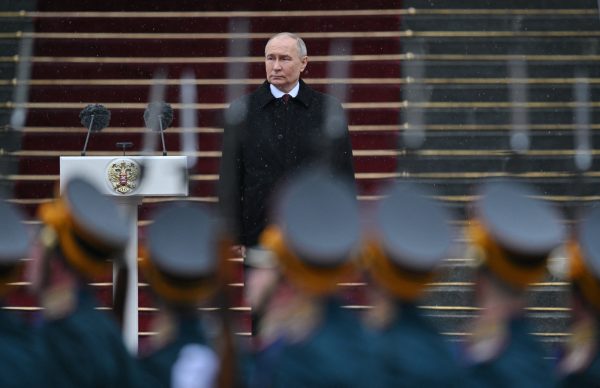Amendments to the Belarusian Constitution have been approved — the Central Election Committee said on February 28 that preliminary results for the previous day’s showed 65% of votes in favor.
The changes include the end of Belarusian non-nuclear status, and allowing the regime to accept Russian nuclear weapons.
“If you (the West) transfer nuclear weapons to Poland or Lithuania, to our borders, then I will turn to Putin to return the nuclear weapons that I gave away without any conditions,” said Aliaksandr Lukashenka, the country’s dictator.
More broadly, changes to the system of government mirrored Vladimir Putin’s authoritarian constitution, confirmed Belarus as a vassal state of the Kremlin, and pointed to further moves to build the hitherto Potemkin Union State. Lukashenka’s three-decade-long struggle for a measure of independence from Russia is largely over.
The central change is the empowerment of the ABPA (All Belarusian People’s Assembly) at the expense of its parliament, with dictator Aliaksandr Lukashenka “pet sobranie” acquiring the authority to impeach the president, and absorbing into a single body prerogatives hitherto belonging to a plurality of organs and committees, especially from the financial and economic sector.
Any president who has left office will be immune from prosecution for any deed done in his former capacity.
Amendments include the “nullification” of Lukashenka’s presidential terms served so far (he became head of state 28 years ago), giving him the potential to stay in power until the age of 81. The changes may allow him to gracefully retire, but there are few signs he has any intention of doing so. There has been speculation that he may seek the top role in the new assembly, given it has notional powers to monitor and impeach the president.
Lukashenka’s migrant weaponization policy, applied by collecting and encouraging developing world migrants to cross into European Union neighbors last summer, is now enshrined through the right to “grant shelter” to “foreign citizens and stateless persons.” Belarus will also become what is termed a nuclear developer “for peaceful purposes.”
Amendments very similar to the 2020 Russian Constitutional reform are even more revealing. Many changes are essentially copy-pasted from the 2020 “Putin constitution,” which were approved thereby referendum in March.
Both embed the primacy of the respective constitutions over every other source of law, and state that no external agreement has a superior status. Both require the preservation of “historical memory” as a constitutional duty. These are not mere words — Russia’s brutally applied “Law on foreign agents” derives from this clause and has been applied to close independent media outlets and its main human rights organization, Memorial, and to jail sentence to the Gulag historian Yuri Dmitriev. In Belarus, as in Russia, citizens will be expected to “show patriotism” and to display “social responsibility.”
Both documents specify the nature of marriage as being between man and woman; both documents pay particular attention to children’s education.
The newly regulated assembly will be twinned, in role and functions, to the Russian Federation Council in which the retired (and immune) president takes the lead. It has the same power to impeach the president; the members of the assembly are selected and catechized for loyalty.
Back in March 2020, Putin invited voters to endorse the constitutional amendments “for the country we want to live in,” and “for the country we want to leave to our grandchildren.” Putin is a child of Soviet legal culture, a system that sought to impose social norms through legal regulation, an approach which he also uses to codify compliant behavior among his neighbors.
It is no accident that one key Russian demand before its invasion of Ukraine was that the country accepted constitutional changes. Russia has attempted to put similar pressure on Georgia.
It looks like Putin has decided to become a new sobiratel’ zemel russkikh, or Gatherer of the Russian Lands as Ivan III was known. Perhaps he will succeed, but if not, his new vassal Lukashenka will drown with him, amended constitution or not.
Claudia Palazzo is an Italian journalist and political analyst on Eurasian affairs. She publishes for the Jamestown Foundation, Italian Eco Internazionale, and is the Rome special correspondent for the Kyiv Post.
Europe’s Edge is CEPA’s online journal covering critical topics on the foreign policy docket across Europe and North America. All opinions are those of the author and do not necessarily represent the position or views of the institutions they represent or the Center for European Policy Analysis.





